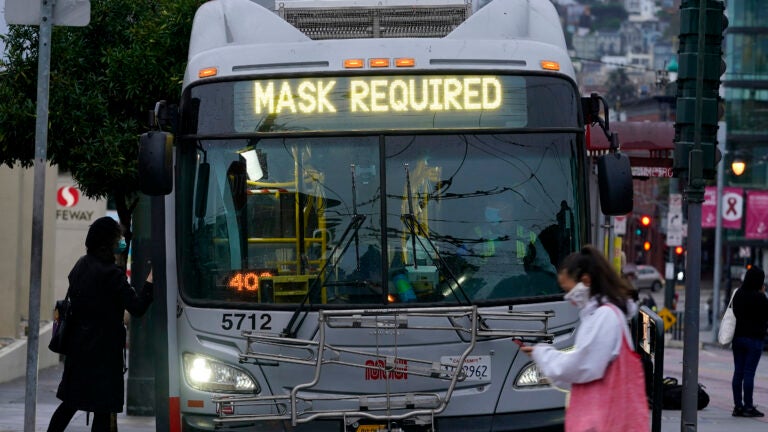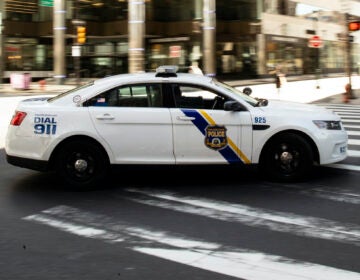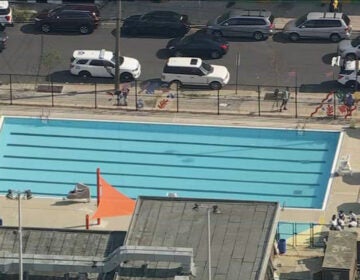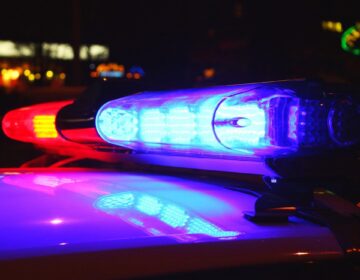Philly police: Face masks are the ‘number one obstacle’ for homicide investigators
The department’s homicide clearance rate dropped significantly last year. Police say shooters wearing face masks is a big reason why.

A sign on a bus advises that passengers are required to wear masks. (Jeff Chiu/AP)
As gun violence continues to surge, Philadelphia police say the “overwhelming majority” of shooters have been wearing face masks since the start of the pandemic, making it more challenging for homicide investigators to identify and arrest suspects.
“That’s our number one obstacle,” said Capt. Jason Smith, who leads the unit.
The department doesn’t keep statistics on the number of perpetrators wearing face masks, but Smith said they are undoubtedly more prevalent among shooters than before COVID-19 stitched masks into daily life.
It’s no coincidence, he said, that the department’s homicide clearance rate dropped significantly last year, the deadliest in three decades.
“There’s a few reasons why our clearance rate dropped 10 points year over year, but COVID-19 and the wearing of face masks, I would attribute that as being the number one factor,” said Smith.
In 2019, which ended with 356 murders, the clearance rate was 52%, according to police.
Last year, the city had 499 murders. The clearance rate was just over 42%.
To get around this new handicap, Smith said investigators are now reviewing surveillance video from the day and time of the incidents, as well as the hours and days before and after. The hope is the additional footage will show suspects without masks, or at the very least provide more identifying information. For example, face or hand tattoos.
Even if a suspect remains masked, the design of his or her mask could also potentially be used to help identify a shooter, said Sgt. Eric Gripp, a police spokesperson.
Police say more face masks also means an even greater need for witnesses to cooperate with law enforcement, a prospect already hampered by officer distrust, particularly in Black and brown communities, and fear of retaliation for speaking up.
“There’s somebody out there in almost every instance that has information that would be very useful to our investigation,” said Smith. “If we don’t get their cooperation, then a case will languish for weeks, months or even years.”
Anti-violence activists say the normalcy of wearing face masks is one of the reasons why gun violence is on the rise in Philadelphia.
Colwin Williams, who does outreach in high-crime police districts to prevent violence from erupting, said there’s a “different breed” of shooters during the pandemic because of face masks — shooters now feel emboldened to pick up guns because they know covering their faces won’t draw attention to them now.
“A lot of guys wouldn’t have even chanced it [before the pandemic],” said Williams, a street supervisor with Cure Violence. “Now, you can hide behind a mask.”
George Mosee, executive director of the Philadelphia Anti-Drug/Anti-Violence Network, said prior to the pandemic, it was “rare” for suspects to wear face masks, especially surgical-style masks covering everything below the bridge of the nose.
He’s gravely concerned about the impact more shooters wearing face masks will have on the cycle of violence his organization works every day to stop.
“If people don’t see folks getting arrested and brought to justice, then the likelihood that they will do whatever it is that they contemplated — carry a gun with a feeling of impunity, use the gun, whether it’s spontaneously or in a premeditated way — is increased,” said Mosee.
“It’s a Catch-22,” he added. “We want people to wear masks, but we don’t want them to commit acts of violence.”

Get daily updates from WHYY News!
WHYY is your source for fact-based, in-depth journalism and information. As a nonprofit organization, we rely on financial support from readers like you. Please give today.




![CoronavirusPandemic_1024x512[1]](https://whyy.org/wp-content/uploads/2020/03/CoronavirusPandemic_1024x5121-300x150.jpg)


